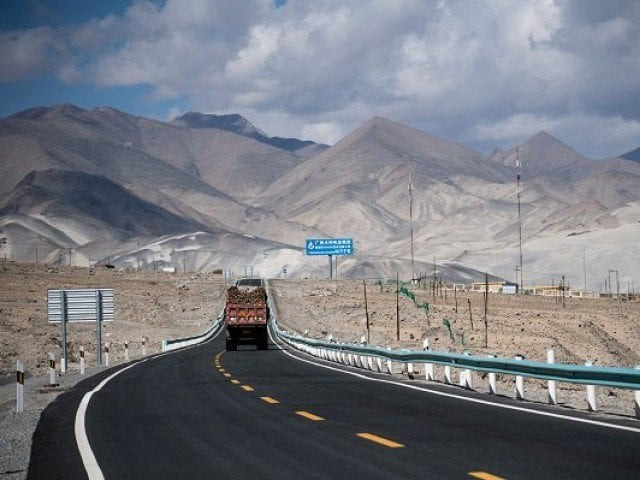8th JCC meeting: 'Missing paperwork' delays CPEC mass transit schemes
Pakistan side failed to complete paperwork on time for mega projects

CPEC route. PHOTO: REUTERS
The status quo remained on $8.2 billion mainline (ML-1) project of Pakistan Railways, $2 billion Karachi Circular Railways, mass transit schemes of Quetta and Peshawar and five small road projects, according to signed minutes of the 8th JCC meeting. The JCC is the highest decision making body of the China-Pakistan Economic Corridor (CPEC) that met last month in Beijing after one year.
China’s National Development and Reform Commission Vice Chairman Ninglizhe and Pakistan’s Minister for Planning and Development Khusro Bakhtiar co-chaired the JCC meeting.
China has declared the $2 billion Karachi Circular Railway (KCR) project ‘technically feasible’ and important for ‘growth and prosperity’ for Pakistan’s largest commercial hub. But Pakistani authorities failed to fulfill the procedural requirements.
“The Chinese side noted the importance of the KCR project for growth and prosperity of Karachi, presented that more endeavours shall be taken to facilitate the KCR project as soon as possible since it’s technically feasible,” said minutes of the JCC.
Some government officials told The Express Tribune that in October last year the Centre raised certain queries on Sindh government’s request for provision of sovereign guarantees but no reply has been received from the provincial government.
The Planning Ministry spokesman on CPEC affairs Hassan Daud Butt did not comment as to why no breakthrough was achieved on mass transit and infrastructure projects during the 8th JCC.
There was a hope before the JCC that some progress could be made on the multibillion dollar ML-I project of Pakistan Railway. However, the minutes said: “The JCC was satisfied with the progress of the preliminary design review of the strategic project of the ML-1 and two sides agreed that the result of the preliminary design shall be completed by January 2019”.
Both the sides have been frequently missing the deadlines on completion of the preliminary design of the strategically important project. But the 8th JCC has permanently settled the question of the financing mode of minimum $8.2 billion project.
According to the minutes, the ML-I “project should be implemented in line with the Framework Agreement signed in May 2017.”
The Pakistan Tehreek-e-Insaf (PTI) government wanted to explore possibility of completing the ML-I project on build-operate-transfer (BOT) basis to shift financial risks of the multibillion-dollar railway project to the contractors.
According to the framework agreement for the ML-I, China will provide 85% of the project cost as a concessionary loan. The project has been declared strategically important by both the countries.
The ML-I project has a total length of 1,872 kilometres. The project’s initial cost of $8.2 billion was based on a joint feasibility study, which was not backed by a technical design study.
Mass transit schemes
Pakistani authorities could not prepare the feasibility studies of Quetta mass transit scheme and greater Peshawar mass transit circular rail project despite the fact that both the sides agreed to include these schemes in the CPEC framework about two years ago.
“The Chinese side agreed that Quetta mass transit and greater Peshawar mass transit circular rail project shall be taken into consideration when there conditions are all mature and agreed that after approval of PC-I these projects shall be submitted to the Joint Working Group on Transport Infrastructure as soon as possible.”
But the JCC expressed appreciation for the signing and implementation of Five-Year for Technical Cooperation on Highway between China and Pakistan (2018-2022). Both sides agreed to jointly conduct traffic destiny study under the action plan.
Both the parties agreed to work jointly for all weather opening of the Karakoram Highway. It was agreed that the modalities of development of cross border facility at Kunjerab for all weather opening of the road will be considered further.
Small road projects
There was also no headway on five road projects that are already under CPEC framework. The minutes said the Pakistani side expressed desire that work on the Raikot-Thakot road and Dera-Ismail Khan-Zhob should be done on priority.
The Pakistani side briefed the progress on the provincial projects and hoped that more endevours shall be made by the Chinese side to facilitate Gilgit-Shandoor-Chitral project, Mirpur-Muzaffarabad-Mansehra project and Nokundi-Mashkel-Panjgur road.
The Chinese side noted the importance of Gilgit-Shandoor-Chitral project and Nokhundi-Panjgur project for the growth and prosperity of these regions. It was decided that these projects will be presented in the next Joint Working Group meeting on transport infrastructure after completion of feasibility studies.
Pakistani side expressed the hope that the groundbreaking ceremony of New Gwadar International Airport will be held in first quarter of 2019, The project faces significant delays. China has provided grant for the airport construction.



















COMMENTS
Comments are moderated and generally will be posted if they are on-topic and not abusive.
For more information, please see our Comments FAQ